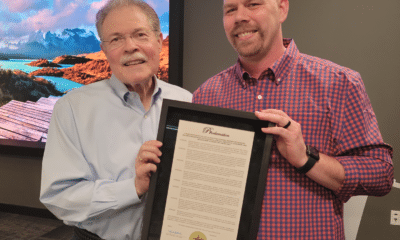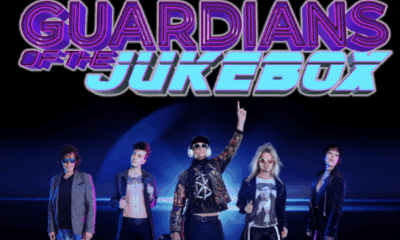City Government
On Topic: City Budget, City Marshals, FAA and Drones and Dog Parks [Podcast]
Published
2 years agoon
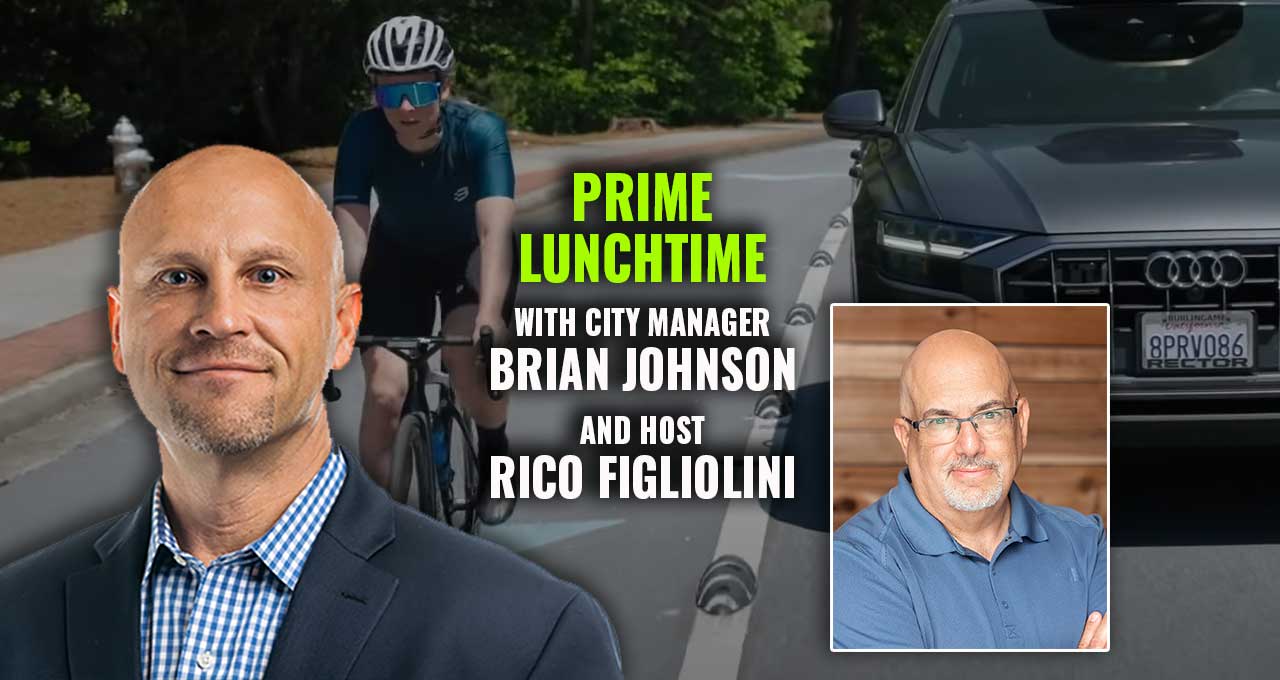
Brian Johnson, the city manager of Peachtree Corners, Georgia, shares exciting updates and plans for the city’s technology and community development. From the successful Curiosity Lab Criterion Road Race to the construction of a new dog park and housing redevelopment, this podcast offers a glimpse into the innovative projects and partnerships that are transforming the city. Johnson’s insights also shed light on how Peachtree Corners invests in its residents’ safety, well-being, and quality of life.
“It’s the wild west when you think about it. There’s a lot of regulations that have to be created for private drones. One day they just become so common that everybody walks out, throws up their own drone and starts doing their thing. Well, if everybody’s doing it, how do you keep it from becoming a problem?”
brian johnson
Timestamp:
0:00:00 – Intro
0:01:11 – The Curiosity Lab Criterion Road Race
0:12:34 – Pickleball Feasibility Study
0:16:46 – The City Marshall System
0:20:44 – Budget, Housing, Dog Parks, and More
0:31:50 – FAA and Drone Programs
0:33:59 – Closing
Podcast Transcript:
Rico Figliolini 0:00:00
Hi, everyone. This is Rico Figliolini, host of Peachtree Corners Life. And today we have Brian Johnson. Hey, Brian, thanks for showing.
Brian Johnson 0:00:05
Rico, how are you?
Rico Figliolini 0:00:08
Good. Been a busy week for you, I’m sure.
Brian Johnson 0:00:10
A lot of them are lately.
Rico Figliolini 0:00:12
Yes, seems to be. Before we get right into it with Brian, city manager here at Peachtree Corners, let’s just say thank you to EV Remodeling Inc. for being a corporate sponsor of ours. Eli, who is the owner of the company, lives here in Peachtree Corners. They do great work, check them out. They’ve been a great supporter of our work as well. We appreciate them for doing that. You could check out EVRemodeling.com and see all the great work that they’re doing here in the City of Peachtree Corners as well as throughout the metro area. So, Brian, it’s been weeks leading up to the event. Last night we’re recording this a day after the Curiosity Lab Criterion Road Race, which was a big event here in Peachtree Corners as part of that speed week that Atlanta is holding and midweek on what started out as a rainy day. But I understand everything went well and phenomenal stuff. Why don’t you give us a little detail about how it went?
Brian Johnson 0:01:11
Well, as you remember, when we’ve talked about this was a result of a conversation and a meeting that we had here at the city when we were at the Consumer Electronics Show in Vegas. And we met with a company called Spoke Safety that has created a device that can allow for enhanced safety for what are termed vulnerable road users, and that are essentially anybody who is on a roadway that’s not in an automobile. So this would be everything from motorcycles down to people who use E-Scooters to bicyclists and even pedestrians. But this device, which is about the size of a pack of cards, allows for there to be two way communication between where this device is and an automobile. And so it’ll basically be telling cars, hey, here is where this vulnerable road user is, and it can receive signals as well to where a car is like, fine, well, this is where we are. And so it can create basic safety messages to where in the case of bicyclist, if you had this device with you and you were approaching a car from the right, the driver of the car would get an alert saying, bicycle approaching on the right. And this company had come up with this technology and they wanted or needed some location that had the infrastructure in place to facilitate the deployment and the demonstration of this technology. And they already had a relationship with Audi and with Qualcomm. And we started talking and I said, well, we have proper city streets to be able to support this at Curiosity Labs. The streets inside of Curiosity Lab can do it. And they got excited. And so then there was talk about, all right, if this is going to be the world’s first deployment demonstration of this technology. We make this into a significant event. How can we make sure that when it’s deployed, it’s done well? And I had some experience both as a participant back when I did a lot of cycling, and as the city manager of a community that had a long standing Criterion event every year, the Sunny King Criterium in Anniston, Alabama. And so I said, what if we did a Criterion here in Peacetree Corners and use that as an opportunity? And they loved it. So the result was, in a very short period of time, we were able to secure a date right in the middle of Speed Week, in between the two weekend events of Athens Twilight and the Sunny King and get a midday event. And we had a Criterium here that was part of the official USA Criterium annual calendar this year. And we had all the racing teams come out here and we created this Criterion. And in between the pro women’s and pro men’s event, we officially unveiled this technology, deployed it on a public street, did it live streaming. This event was live streamed internationally, and the result of it was a successful deployment. We now have an official partnership with Audi Phenomenal. Yes. We will now be exploring the enhancement of this vulnerable road user technology in a way that we can make it better, make it easier to use and to help scale it up so that we can improve the safety of those vulnerable road users that are on the roadway. Maybe one day, if this technology works out, and the theory behind it is sound, but so if it works out, look back and think that we played a small part in helping improve the safety on our roadways.
Rico Figliolini 0:05:14
Yeah, it’s amazing. It’s just the fact that the city is able to do that and provide this atmosphere, this environment, to be able to do that type of testing. I mean, everything starts out with the device. I can actually see this device becoming smaller or maybe even morphing into being able to use it as an app on phones already with GPS locations and stuff. But it has to start somewhere. I’m glad the city is able to provide that environment. And that’s just crazy that Audi is now an official partner in this stuff. There aren’t that many car companies out there, right? So to have to be able to have Audi come and say, we want to be an official partner here, that’s just awesome.
Brian Johnson 0:05:56
It has to go all the way to Germany. It’s Volkswagen Group is who owns Audi. So I had to go all the way over there for them to bless off on it. But they did because we have an environment that they’re really not finding elsewhere. Audi, like the big other Big OEMs, has their own private test track for their vehicles, sure, but this is to do testing with this vulnerable road user technology. And you need public streets and you need the public. So we’ll play a small part. We’ll put some of these devices on our public works vehicles. We’ll put them in our city Marshall vehicles, and we’ll even have our public works employees who are mowing the lawns or the mowing out like Peacery Parkway. Now, you may brought up a good point. This technology is great. And Audi’s testing was for the messages that there’s like a cyclist approaching from the right or whatever to come up on the dashboard of the car. So that’s where Audi is really wanting to have cars coming off the assembly line with the ability to receive these messages. Just where you would where if your check oil light came on or whatever, and it could even be audible if you want it to be. But as we know that even if every single brand new car coming off the line had this, it’s going to be 25 plus years before we flush out most of the existing cars that don’t have that technology. How do we scale this sooner? And you hit it right on, and that is through an app. We talked about it once before. Even if I am going somewhere, somewhere in town, especially closer to Atlanta, where it’s getting more dense, even if I know exactly where I’m going, you know what I will still do? I’ll pull my phone out and I’ll pull the up or Google Maps for the traffic because I want to know, all right, I know how to get there. But is traffic bad? Do I need to take a different route? If you can get we can get this technology to come up messages inside of like Waze or Google.
Rico Figliolini 0:08:11
Perfect.
Brian Johnson 0:08:12
Everybody will be able to use this. So that’s how we scale this. So again, we’re going to do our small part of making our ecosystem available for this type of technology to hopefully become and everything.
Rico Figliolini 0:08:27
Yeah, that makes sense. I can see the applications even if it doesn’t get into ways. Although small companies like this that start off get bought out by larger companies, right, because they get absorbed into their environment, like you said. So this way Waze can be able to provide that information to the driver. I mean, sometimes I’ll put on Apple Map and stuff like that, always just because I may be on the phone and I want the system to be able to tell me, remind me.
Brian Johnson 0:09:01
That’s exactly right.
Rico Figliolini 0:09:02
Yes. My wife says that I don’t even. Have to think of where’s my next turn, because I’m just a good point. Because otherwise you have to be aware of everything around you at every single minute, which I’m not a bad driver, I think a good driver, but it’s like auto assist, right? So I think that’s where we’re going. So, yeah, if it can be in an app like that or I can even see Uber let’s say a lyft looking at that and saying, you know, our drivers this is a propensity maybe, I don’t know what the data shows, but they don’t want the drivers hitting people and having problems too. So I could see a big company like that looking at this also and saying, you know what, that’s not a bad add on to what we’re doing.
Brian Johnson 0:09:52
Yeah, that’d be great points. But at the end of the day we had a pretty cool event. Had a couple of hundred people here as spectators, especially near the end of the evening around seven to around 945 when it ended. And that was with being a first time event. Wasn’t great weather and isn’t in our downtown. I was a little bit worried that the turnout would not be there but was we had food trucks here, we had some companies showing off some other types of technology. The racing teams were out here big and pro racers loved the course. They thought it was very technical and very unique and we had racers from all over the world australia, New Zealand, Europe, all over the country. It was a pretty cool thing. Puts us on the map. It gave our community a unique event go to and we were putting Curiosity Labs ecosystem to use. So all in all, a good event couldn’t do it without rock star staff that put it on. And when you surround yourself with smart people and the tell you the resources they need and you get it to them and get out of their way, it can do some great stuff. So I got an unbelievable staff and the obviously mayor and council the support us, they are open to new things like this. They well attended throughout the course of the day because it started with amateurs 03:00 we even had the small kids race. Five to seven year olds and then like eight to ten year olds and they got on their bikes and the had started here and then at the starting line. And it’s always cool to see those kids, everything from the kids who don’t pedal yet, they just use their feet down with training wheels and others bike and so that was cool too. So it was a good event.
Rico Figliolini 0:12:02
It takes a lot of logistical work to get this put together, especially in that short amount of time that you guys had.
Brian Johnson 0:12:09
Early February is when we decided to do it. Yeah, pleased with it. So I think right now we’re probably leaning forward in the saddle on doing it again. I don’t really have a reason not to so other than just the time and energy it takes to set it up. But anyway, good things happening here. Never a dull moment.
Rico Figliolini 0:12:34
No, for sure. And we should hit upon a few of these things as some quick bursts because there are quite a few things well, not quite a few things, but there’s always a lot of things, but there’s four elements that we just want to hit real quick on. We’ve dove into them in more detail before, but just to give an update on it. So we discussed at one point about pickleball looking at possibly a 40 or 50 court facility here in Peachtree Corners. And I think the largest is what I found the largest in the metro area was 25, I think, or something when I was checking stats on that, of what was available. So feasibility study happening, not happening. Where is that going?
Brian Johnson 0:13:18
Yes. So we talked about it. Yes. For us to do this right, to not shoot too high, too low, we brought some professionals in. So it’s a sports facility consulting firm that does feasibility studies. So we’ve commissioned this firm to do one. It’ll take about a month and ultimately they’ll come back and they’ll tell us what is the market we’re competing with, what’s the demand out there? What can we expect as far as special events and how much economic development activity? What about ongoing, what size does it need to be? Are we going to cannibalize something if we do it? All of the things to consider and then based on that, mayor and council can look at it, make a decision on does the city want to facilitate doing something? Maybe we do and it’s smaller than we thought because of whatever. Maybe we shoot for the stars and we want to do it, who knows? But got about a month and when they present the results, I’ll end up organizing a meeting and invite kind of the people in Peachtree Corners that are involved in Pickleball and care about it. Everything from even you as you’ve gotten more interest in it, to people who play it a lot, to companies who are looking to maybe even be involved in managing it if we do it. Just kind of get everybody together and let them hear the results and we’ll see where it goes from there.
Rico Figliolini 0:14:48
Cool. So we’ll see that study sometime after that. Four weeks probably at a city council meeting, I guess, or a public meeting.
Brian Johnson 0:14:57
To be honest with you. I’ll probably have the results presented before that at a different meeting and then go in front of council because council is going to need to make a decision based off of it. That would be more of what they do at the city council meeting is say, all right, we heard the results, we’ve had a chance to digest it. This is what we’re going to do about it. So I’ll probably just have schedule an evening one night or maybe a lunch one. And it’s going to be inviting the people who have reached out to me and are involved and have been like, man, I played a lot, what can I do? To whatever people who care about it? Those are the ones who are going to want to hear the results so maybe we do it over lunch one day and have some pizzas or whatever and do something like that. But yeah, sounds good. End of May. Beginning of June.
Rico Figliolini 0:15:54
We’ll have the yeah, I mean, there’s quite a few. It’s amazing how many businesses in the metro area and certainly there’s a few in the corners that are pickleball oriented within the industry and coaches, registered coaches and stuff like that.
Brian Johnson 0:16:10
Just announced the Pickleball League. Now I’m sorry, Atlanta just created a pickleball league.
Rico Figliolini 0:16:16
Yes, I heard that. This is the Atlanta law and tennis.
Brian Johnson 0:16:24
Yeah. So clearly there’s a demand. The question is, is it enough for the city to end up putting any time, energy and is what usually happens, money into facilitating something. And we want to make sure that we are shooting at the bullseye that we need to and it’s not too big, too small, whatever.
Rico Figliolini 0:16:46
I love the fact that the city not only looking at cutting edge technology, but they’re looking at other areas that might be great for our citizens and also the impact that it gives to this community. So got to love that. We also talked about city marshall in a couple of podcasts, the city marshall system. So it finally sounds like we’re starting to move on it. And you were saying that May 1. What’s happening?
Brian Johnson 0:17:10
May 1, beginning of May. So it’s in the budget. Council seen the rough draft of the budget and as we talked about before, they supported it. So we’re going to stand up a city marshall program and it’ll start with three. And so I’m going to start putting out the job announcement out there with the requirements and sometime beginning of May they’ll go out and the the June time frame is when we’ll be doing the interviews and job offers and July 1, when our next fiscal year starts. Now there’s the money in the budget to start standing it up. So sometime in July we’ll start having actual uniformed city marshals here and they’ll start filling in those gaps that we talked about before that we kind of feel the need to have filled. So the step in council feeling like they’re doing everything they can to try to make the city as safe as we can and they’re going to be post certified. We talked about just like Gwynette police. Duluth police, they will have the same exact authorities as any other police officer. Where they will be limited is by policy. So policy that we adopt, mayor, council adopt will end up being the one that keeps establishes their left and right limit. So for instance, by policy we’re not going to have them out on roadway shooting radar guns and riding speeding tickets. Will they have the authority to do that? Absolutely. But we’re not going to have the do that because that’s not going to be in their job description as the city marshal is defined by policy. So that’s how we’re going to orient their activities through those policies.
Rico Figliolini 0:18:55
So the city has already gotten all the logistics down and stuff. Do you know where they’re going to be? Sort of office out of, if you will.
Brian Johnson 0:19:03
Yeah, it’ll be out of City Hall. We actually, because of the lead time, purchased the vehicles. We purchased one truck. F 152 Ford Police Interceptor Explorers. They’re hybrid. They’re all hybrid vehicles.
Rico Figliolini 0:19:20
Oh, cool. Okay.
Brian Johnson 0:19:21
Not all EV. Trying to get like what’s the Ford pickup truck? All EV? What is that? The, I don’t recall anyway. But they have an all EV pickup truck. The lead time was like a couple of years. That wouldn’t work. We got hybrid. The truck will be outfitted in a way that we can have a drone take off from the back. We will be integrating a lot of drone stuff with the city Marshals as a technology asset for them to use to maybe do things preemptively. Maybe they fly them over problem areas helping to prevent hopefully, but if not solve criminal activity or do certain things. We’ve gotten some of those. They’ll be housed in City Hall. Okay, so got renovation going on to reconfigure some of the interior spaces of the building to facilitate their activity. And they’ll have a room here where they’ll be able to pull all the images off of all of our flock cameras and all the other video cameras and the fūsus system.
Rico Figliolini 0:20:40
So we’ll be connected to the fūsus system.
Brian Johnson 0:20:43
Absolutely.
Rico Figliolini 0:20:44
Excellent. Good deal. Talking about budget, that’s coming up, right? Because it’s the June budget, the annual.
Brian Johnson 0:20:51
It is the May City Council meeting is when we’ll officially present the budget to council and community will be able to comment on what they hear. So that will be at the May Council meeting and then in June is when council will adopt it budgets. There’s not a lot of surprises. Obviously one of the big ones would be the City Marshall program. One of the other byproducts of that is we’re bringing the city attorney position in house. No longer be an employee of a separate law firm just because when you combine what additional municipal court activity we’re going to have in addition to all the Curiosity Lab stuff, we just need to have legal counsel here all the time. There’s just too much going on. And so it doesn’t make sense to always try to pay the overhead to a law firm when you’ve got somebody who’s here all day every day anyway. But yet they’re not here. They’re an attorney of another firm. So that’s a byproduct of it. There’s no financial hit. It’s just moving. Instead of paying a third party, it’s.
Rico Figliolini 0:22:05
Bringing yeah, probably better. The cost probably be a little better anyway.
Brian Johnson 0:22:11
Yeah, there’s a little bit of now you’ve got the cities having to pay health insurance and other things. So we don’t pay the overhead for that to the law firm. We’re doing it in house. So it’s a wash for all intents and purposes. A couple of things in there maybe of note, definitely got we’ve increased the amount of money we’re putting towards street resurfacing. We’ve got more money in there for multi use trail activity. Trying to do more of that. Really focusing on some of the bigger sections like Crooked Creek down the south side of the city. We’ve got a couple of projects that we’re looking to do on the south side we’ve talked about. One is some trailheads and public amenities along Peachtree Corners circle in between Holcomb Bridge and PIB. That would be part of that. We’ve got money there. We’ve got some money. A couple of million dollars set aside to do some housing redevelopment in the south part of the city to look for properties that are in foreclosure and in a state of disrepair. And the city may end up looking to acquire property and then turn around and have call it starter homes built to help with some of the housing.
Rico Figliolini 0:23:40
So we’re talking about affordable starter homes versus three quarter of a million dollar homes.
Brian Johnson 0:23:45
Correct. That’s what I’m saying. We would end up because we’re involved, we’ll be able to make it to where it truly is a starter home and it’s an equity it would be equity product. It would still be home.
Rico Figliolini 0:23:57
Right.
Brian Johnson 0:23:58
But yes, there would be some sort of a home value control set on it so that the market doesn’t push it to a point where it’s another example where it’s unachievable for.
Rico Figliolini 0:24:13
So would it be similar to like, I don’t know how Habitat for Humanity works, but would it be like a lottery system in a way because otherwise the market will push that. Right.
Brian Johnson 0:24:23
Well, you use one of the best examples is one of the partners we would look to work with is Habitat.
Rico Figliolini 0:24:28
Okay, cool.
Brian Johnson 0:24:29
That’s exactly, Gwinnett Housing Authority has programs where they’ll come in and they’ll build houses and it’ll be specifically oriented to a particular demographic. It’s an equity product, it’s a new home. But you control the purchase price through the agreement you have with the entity building it’s saying you can’t sell this for a value above X because that’s not the intent of why we’re doing this.
Rico Figliolini 0:24:58
Yeah, otherwise that would just fail at that point. Right. For being what you exactly.
Brian Johnson 0:25:03
We’re not filling a housing demand in that particular income strata in this way. We have some of the money set aside from the ARPA funds.
Rico Figliolini 0:25:15
I was going to say. So there’s federal funds also for that.
Brian Johnson 0:25:18
And so the intent would be remove substandard housing stock from our roles and replacing it with new stock, but that it’s got to control so that it doesn’t get out of hand price wise. And so now we’ve, in a small way filled the demand for starter homes in an area and at the same time we’ve removed some cases squalor or vacant homes or foreclosed on homes. And so it’s a win win. So there’s money in there to do some work there. On the south side, we’ve also got there’s going to be a dog park constructed at the Town Center.
Rico Figliolini 0:26:01
I heard that. That’s cool. A small dog, big dog, or are they going to be like.
Brian Johnson 0:26:09
There are going to be two separate halves to it. It’ll all be Astroturf inside there. So it’s not going to be like just a fence around woods, but it’ll be there at the Town Center in the woods. Probably the best way to get there would be to walk in from the side parking lot, that’s surface parking lot next to Cinnabistro. Yeah, it’ll be down there in the woodline. That’ll be about the area.
Rico Figliolini 0:26:37
That’ll be interesting. Artificial turf for the dog park.
Brian Johnson 0:26:43
Well, if you don’t do artificial turf, you start getting into dogs digging. It can get muddy. If it’s rain, it starts to defeat the purpose. So it will be Astroturf on the inside, and there will be a separation. There’ll be two different ones, one for bigger dogs, one for smaller dogs. There’ll be shade structures inside, seating areas for the owners in there so that’ll go in over the summer.
Rico Figliolini 0:27:10
Okay.
Brian Johnson 0:27:11
Then right after the last event on our summer event calendar, I think it’s the last weekend in November, we will do two things. One is we will be removing and relocating some of it. The very first three playground pieces of equipment that went out to the Town Center was the slide. And then you’ve got those two playground pieces. That area will be relocated in a tot playground, like oriented for four years, and younger will go in that area. So you’ll have the call it the succession of age where you have four and under will be in that area. Then if you go five to whatever age you’ll go to where the Qantas is and the big stuff. And then theoretically, if you outgrow the Qantas and everything as like my 14 year old son would tell me that’s kid stuff, he’ll go want to go to the fitness trail? And him and his buddies like to see who can climb the ropes, navigate some of those obstacles the fastest or whatever. But for a kid, if you adhere to the rules and the ages or whatever, you have kind of a succession of difficulty, if you will. So that won’t start until after the last one because that’ll be a little bit of a mini construction area, and we don’t want to do that. The other thing we’re going to do is at the same time, after the same event is we will be closing the inside of the sidewalk that forms the big circle there for the Town Green.
Rico Figliolini 0:29:00
Okay.
Brian Johnson 0:29:00
We’re going to be removing all the soil and replacing it with a drainage field. Because if you’ve been out there, you can tell that when it’s lumpy. And the reason is that way is because when it was put in. Originally our private partners just put grass over what was existing. And what was existing is the clay that we have here in Georgia. And when you put a lot of weight on the clay, when it’s wet, what will happen is it’ll squish down and then when it dries out, it hardens so it doesn’t go back to where it was. And then there’s no drainage that’s been placed in there. So we’re going to remove all the bad clay soil we’re going to put back in. It’s kind of like the French drain type of underground drainage field to allow it to drain away and then put good dirt, no clay, and then put sod back. We’re going to try one more time with the good soil and drainage to actually have real grass. Sod otherwise putting Astroturf into it. But it’s got a different feel. It’s always nice to sometimes have grass we’ll see, but we’re not averse to if we can’t keep it, we can’t keep the grass. If it’s being used too much, trampled on too much. We may have to go to the artificial turf, but right now we’re going to put back sod but that’ll happen in December, January time frame.
Rico Figliolini 0:30:33
Right.
Brian Johnson 0:30:33
And hopefully that so we’ll have one more season where it’ll still be a little lumpy and everything.
Rico Figliolini 0:30:41
I think people will be fine.
Brian Johnson 0:30:45
Those two things are not going to happen until after the concert series done. So we don’t interrupt any the dog park is not interrupting anything. So that’ll happen. So, yeah, more stuff with the Town Green. And then of course at the time of this recording, a couple of hours from now, the Forum North American Properties is having the groundbreak. Yeah, they’re groundbreaking on the first phase of the Forum’s redevelopment and they’re going to removing the first section of interior parking spaces and put in the first section of the Linear Park. And then they’re going to put in the food hall and the outdoor seating there at the north end of the Forum. So that’ll be happening. The parking deck will be start construction on it sometime later on this 2023 season. And so once that is finished, they’ll then be able to remove the remaining three quarters of those parking spaces and finish the Linear Park. So the Forum is moving ahead as well. So we got some stuff going on still.
Rico Figliolini 0:31:50
Yeah. Interesting. Well, lots of stuff to probably keep going. I know you were in DC a few weeks ago about with the FAA, and so I know that you were talking about more drone activity projects probably coming. Why don’t we make that the last thing? What quick hits can you tell us about that, about the FAA, the drone programs that you think might be coming here?
Brian Johnson 0:32:12
Based on a visit that we had from the deputy administrator of the FAA who is in charge of drone regulation. He had been out here at Curiosity Lab once he invited us back to DC to meet with the entire drone regulation team for the FAA to talk about what Curiosity Labs ecosystem might offer to the FAA as it looks to figure out how to regulate this type of thing. And they’re in the business of needing more data and data in certain areas. And so we discussed and have come up with some areas where we can really help them out. Areas partnering with T Mobile, Deutsche Telecom and their 5G wireless environment here. FAA is very interested in how well it can handle multiple drones using the same wireless signal, especially when it gets beyond visual line of sight where the drone operator can no longer see directly drone. We’re going to do some stuff in that space and then our city marshals are going to end up doing some things around law enforcement and the use of drones, which is a different area of regulation that they’ve got to get into. So we’re going to be doing some things to help them ultimately come to a point where they can feel like they can start issuing regulations on some of this stuff. It’s the wild west to think about it. There’s a lot of regulations have to be created for private drones. One day they just become so common that everybody walks out, throws up their own drone and starts doing the thing. Well, if everybody’s doing it, how do you keep becoming a problem?
Rico Figliolini 0:33:59
And it’s been out there a while, so it’s interesting how long it’s taken to get that regulation place. People are talking about AI and how long regulation will be in place for that. Who knows? It’ll be another decade before we say, that cool. Just a lot of stuff going on in the city of Peachtree Corners. You guys are busy and have a vision and I’m just excited to see these things happening. So Brian, I appreciate you coming out every month giving us all thanks for having me.
Brian Johnson 0:34:28
Again, thanks for providing us this opportunity to let everybody know of the cool things that our great community has going for it and what we’re doing to leverage to make it even better. So appreciate it.
Rico Figliolini 0:34:39
Yeah, no worries. Thank you again and thank you to EV Remodeling Inc. For being a great corporate sponsor of ours and the work that we do in both in print and the podcast. So check them out. EvRemodelingInc.com. Brian, thank you so much and we leave your comments if you have any, in the comments below. And stay safe out there. We’ll see you next time. Thanks, guys.
Related

City Government
Brandon Branham Honored for Transformative Leadership in Peachtree Corners
Published
3 days agoon
May 20, 2025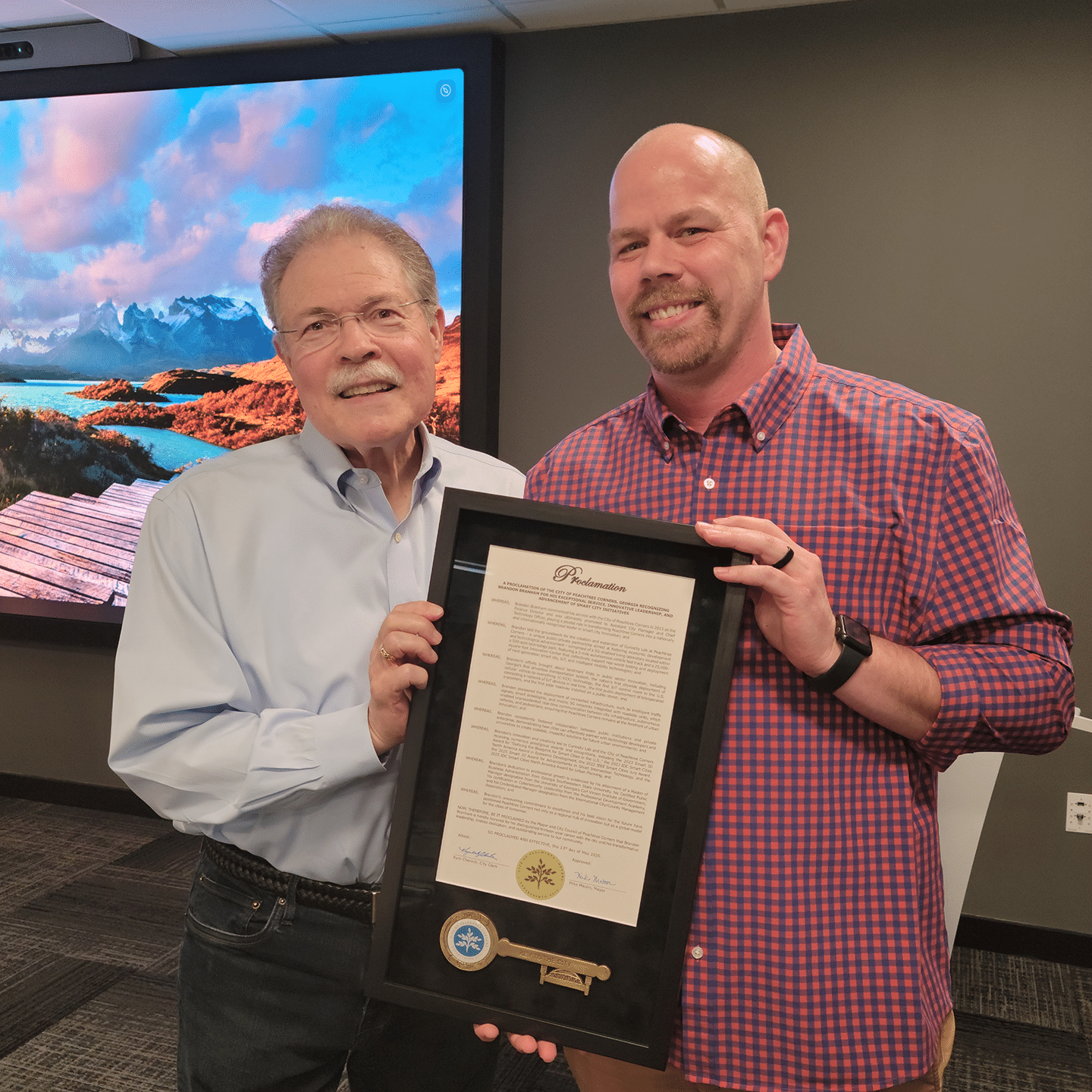
The City of Peachtree Corners recently honored Assistant City Manager Brandon Branham with an official proclamation for his years of leadership and service to the city.
Branham began his tenure in 2013 as finance director and was later promoted to assistant city manager and chief technology officer. In each of those roles, he’s played an instrumental part in guiding Peachtree Corners’ transformation from a suburban community into an internationally recognized hub of technology and innovation.
A decade of accomplishments
Among his many accomplishments, Branham spearheaded the development of the Curiosity Lab at Peachtree Corners, a 5G-enabled living laboratory and innovation center located within a 500-acre technology park.
Under his leadership, the city also achieved numerous national firsts in public sector technology, including the launch of Georgia’s first driverless shuttle system, the country’s first citywide C-V2X (cellular vehicle-to-everything) deployment and the first solar roadway installed on a public street.
“Brandon’s vision and commitment to innovation have positioned Peachtree Corners at the forefront of smart city development not just in Georgia, but across the nation,” said City Manager Brian Johnson. “His leadership has shaped the future of our city, and we are deeply grateful for his service.”
Partnerships and collaborations
Throughout his twelve-year career with the city, Branham emphasized collaboration between the public and private sectors, creating partnerships with tech companies and academic institutions to pilot scalable, real-world solutions.
His efforts have garnered numerous accolades for Peachtree Corners, including multiple Smart Cities awards and recognition for urban planning and intelligent mobility technologies.
New opportunities
Now, as Branham prepares to leave his role and move on to new opportunities, the City of Peachtree Corners “extends its heartfelt appreciation and best wishes for his continued success.”
“Brandon has left a lasting legacy,” Johnson said. “We look forward to seeing the impact he’ll continue to make in the smart city space and beyond.”
Related
City Government
Peachtree Corners Hosts Discussion About the Future of Local Policing
Published
2 weeks agoon
May 12, 2025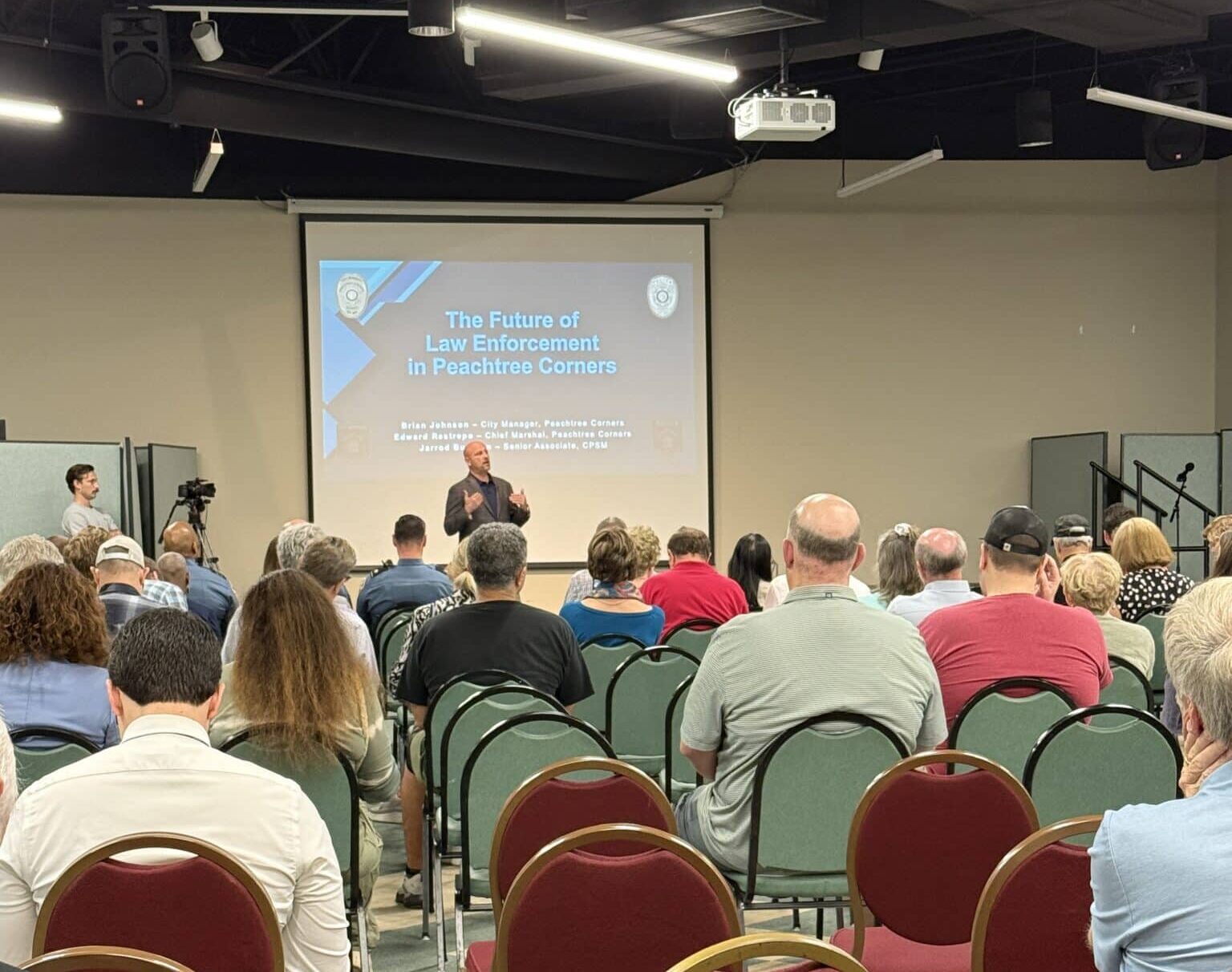
Although crime isn’t on the rise, and the Gwinnett County Police Department (GCPD) is fulfilling its role in fighting crime, the City of Peachtree Corners is asking residents, business owners and city stakeholders if they believe the city should form its own police department.
With over 100 people in attendance, City Manager Brian Johnson led the discussion about the future of policing in Peachtree Corners. He presented the findings from a survey conducted by the Center for Public Safety Management (CPSM), a nationally-recognized law enforcement consulting and training firm, as well as information about patrol officer staffing, response times, costs to tax payers and a potential timeline.
Ensuring public safety
Johnson kicked off his presentation by explaining that it is the duty of the mayor and city council to ensure public safety, including reviewing law enforcement.
“Maybe it needs to grow, maybe it needs to change its focus. But city council is the one that has the decision-making responsibility,” he said.
He was also adamant that this isn’t a done deal.

“I hit this point already, but I want to hit it again. This is the start of a conversation, a community conversation and feedback to council. There hasn’t been a decision,” he said. “Council has not received this presentation from me. They’re here to watch and learn from your feedback of this.”
Mayor Mike Mason was present at the meeting, along with all of the city council members except Eric Christ who was out of town and watching remotely.
Issues and obstacles
Johnson explained that the grounds for the inquiry were based on issues about communication, access to information and enforcement of city-specific ordinances. He cited an example where a city rule that private residences can’t be rented on a short-term basis like Vrbo or Airbnb wasn’t enforced by GCPD. An owner tried to circumvent the ordinance by only renting the outside of the house. A loud pool party ensued, and frustrated neighbors dialed 911.
“Officers showed up and they said, ‘We can’t enforce the city’s noise ordinance,’” Johnson said.
The first stage to fix this problem was creating the marshal program to bridge the gap between code enforcement and GCPD.
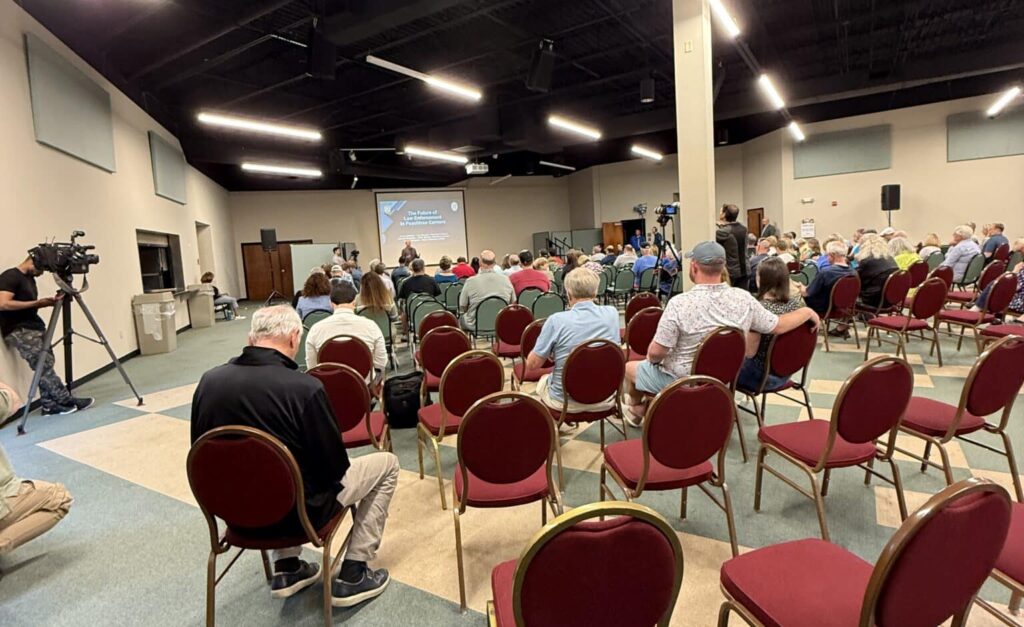
“[We thought] they would be able to enforce both local ordinance and state law, since they are a function of the city, and they could maybe be a force multiplier for Gwinnett since [marshals] don’t have to respond to 911 calls,” said Johnson.
But other issues arose shortly after the department was formed.
“We were still working towards getting that good balance, but we have been faced recently with a couple of things that make it harder for us,” said Johnson.
Seeking shared access
Instead of GCPD giving PTC marshals read-only, quick access to incident reports, dispatch calls and other information, the marshals department was required to file open records requests through the same process as any civilian.
“They were denied, as well as the city of Sugar Hill, [when] asked for the ability to see, not change, but see the computer-aided dispatch information, so that they would know where Gwinnett County police officers were; so that they could avoid stepping on their toes or maybe looking to support their efforts, and they haven’t been granted that,” said Johnson.
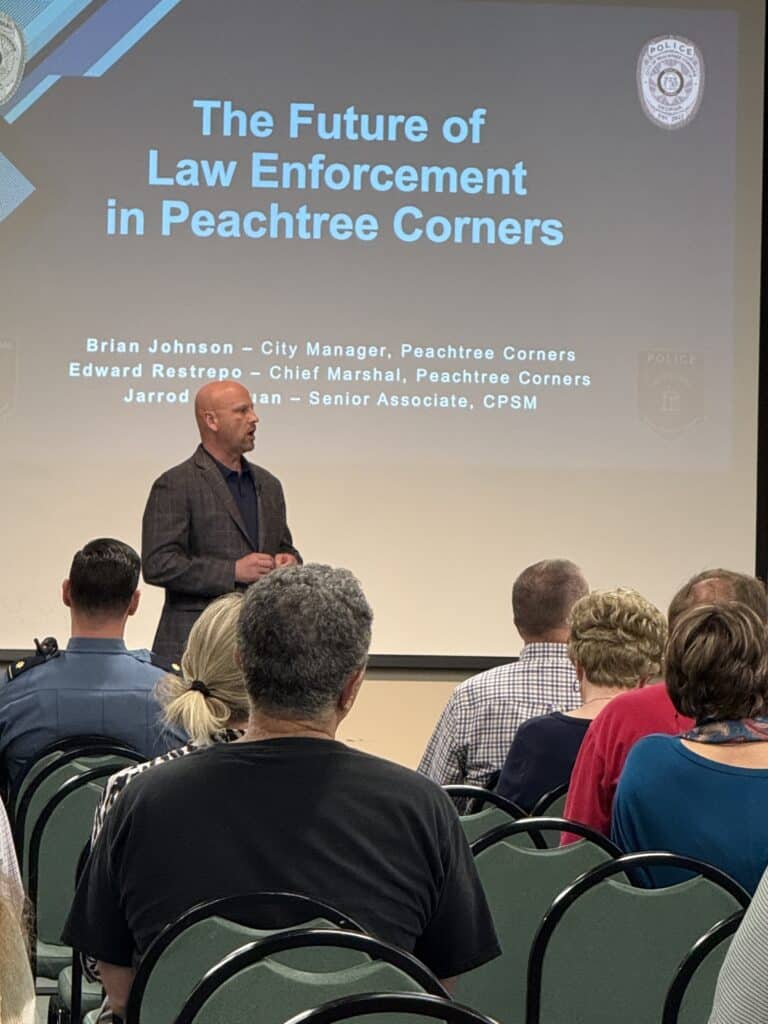
He added that the GCPD has video cameras on certain roadways that are used for various reasons, and law enforcement can use them when there’s crime in the area. Peachtree Corners marshals were denied access to those cameras.
“Conversely, we have a couple hundred cameras in the city, and we definitely want them to have access to them,” said Johnson. “So the frustration out of not being able to get that symbiosis between the marshals and police made us start thinking, all right, you know, is there another option?”
Community feedback
CPSM utilized data from GCPD to discern if Peachtree Corners could feasibly stand its own force. It also took into consideration crime trends, costs and many other factors. It recommended a 55-officer department, costing $12.1 million annually, with a $2.2 million upfront cost.
Comparing the two options to “renting vs. owning” the primary law enforcement agency in the city, Johnson presented pros and cons for each. Once the question-and-answer portion began, there was no obvious choice. Men and women, young and more advanced in age, had both similar and differing opinions.
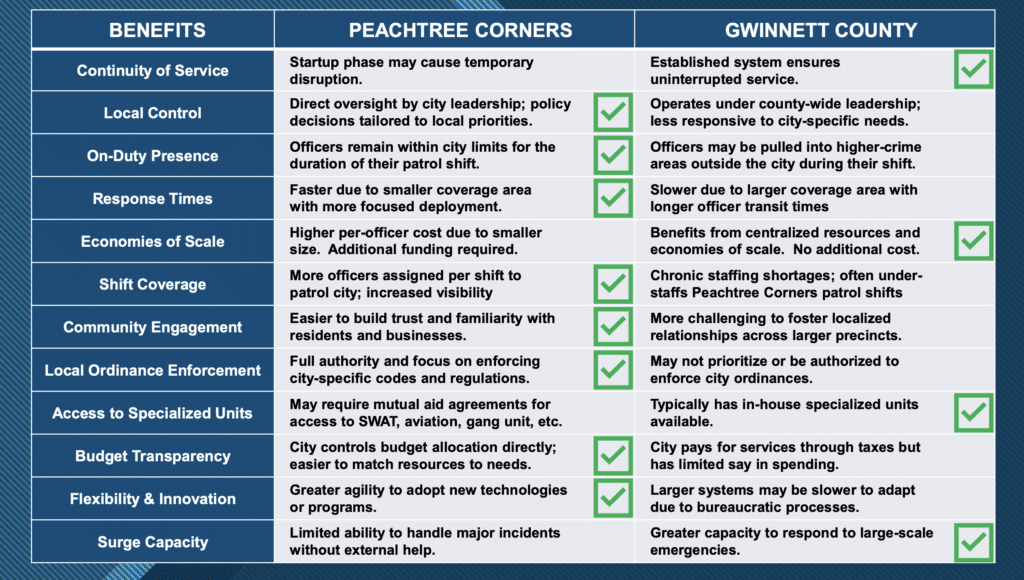
One young man, who identified himself as a local small business owner named Alexander, argued that with artificial intelligence increasing the efficiency of administrative tasks, perhaps the city wouldn’t need a full 68-man department of civilians and sworn officers.
Some accused the city of devising a solution in need of a problem. Others were concerned that paying approximately $100,00 for a study was throwing good money after bad.
But at the end of it all, the city is continuing to seek feedback and is encouraging everyone to make informed decisions. The meeting was taped and is available on the city website along with Johnson’s PowerPoint presentation, a copy of the study done by CPSM and a survey.
As far as a timeline goes, city officials would like folks to take the summer to mull it over and come back in the fall to take another look at the proposal.
Related
City Government
City of Peachtree Corners Awarded Certificate of Achievement From GFOA for Seventh Straight Year
Published
2 weeks agoon
May 9, 2025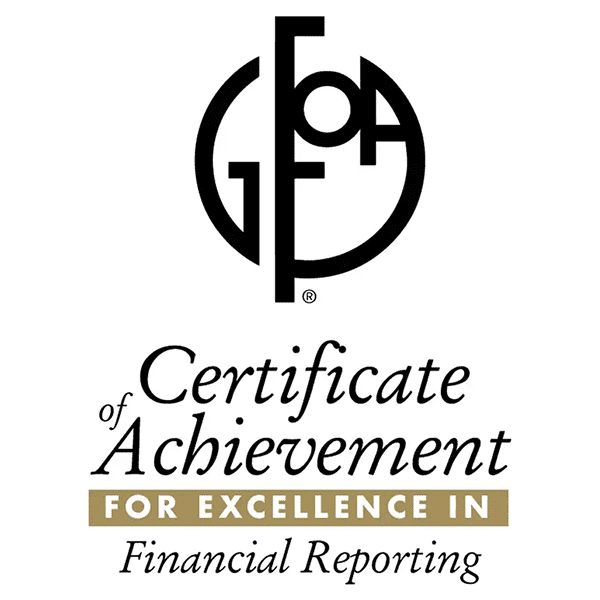
The City of Peachtree Corners’ finance department has been awarded a Certificate of Achievement for Excellence in Financial Reporting from the Government Finance Officers Association of the United States and Canada (GFOA) for its 2024 financial year-end comprehensive annual financial report (CAFR).
The GFOA’s Certificate of Achievement is the highest form of recognition in governmental accounting and financial reporting, and its attainment represents a significant accomplishment by a government and its management.
It is the city’s seventh year of receiving the award and represents a significant accomplishment by the city’s finance department and its leadership.
According to a GFOA release, “The report has been judged by an impartial panel to meet the high standards of the program, which includes demonstrating a constructive ‘spirit of full disclosure’ to clearly communicate its financial story and motivate potential users and user groups to read the report.”
“We are pleased to again receive this honor,” said City Manager Brian Johnson. “Our finance department, and Finance Director Cory Salley, are to be commended for this achievement, as it is the highest form of recognition GOFA presents.”
A comprehensive annual report
The city’s finance department produces the CAFR each year and works with independent auditors to verify the city’s financial situation and standing.
“This prestigious award affirms Peachtree Corners’ dedication to exceeding basic requirements by producing comprehensive annual financial reports that reflect a strong commitment to transparency and full disclosure,” said Assistant City Manager Brandon Branham.
About the GFOA
The Government Finance Officers Association (GFOA), founded in 1906, represents public finance officials throughout the United States and Canada.
The association’s more than 20,000 members are federal, state/provincial and local finance officials deeply involved in planning, financing and implementing thousands of governmental operations in each of their jurisdictions. GFOA’s mission is to advance excellence in public finance.
To learn more about the GFOA, visit gfoa.org.
For more about the City of Peachtree Corners, visit peachtreecornersga.gov.
Related
Read the Digital Edition
Subscribe
Keep Up With Peachtree Corners News
Join our mailing list to receive the latest news and updates from our team.
You have Successfully Subscribed!

Peachtree Corners Hosts Discussion About the Future of Local Policing

MomoCon 2025 to bring 60,000 Fans to Atlanta for a Weekend of Cosplay, Animation, Gaming and Music

D1 Training Brings New Fitness Concept to Peachtree Corners

Atlanta’s Dog Howl-O-Ween Festival Moving to Peachtree Corners for 2025

Local Special Olympics Pickleball Team Honored with State House Resolution

From Boardrooms to the Himalayas: Vandana’s Journey to Purpose and Growing with Intention [Podcast]

Brandon Branham Honored for Transformative Leadership in Peachtree Corners

Music Matters Productions Expands Peachtree Corners Headquarters

Celebration and Community: ICAGeorgia Wraps Up School Year with Two Festive Events

PTC Concert Series: Guardians of the Jukebox on May 31

Music Matters Productions Expands Peachtree Corners Headquarters

Brandon Branham Honored for Transformative Leadership in Peachtree Corners

From Boardrooms to the Himalayas: Vandana’s Journey to Purpose and Growing with Intention [Podcast]

MomoCon 2025 to bring 60,000 Fans to Atlanta for a Weekend of Cosplay, Animation, Gaming and Music

Local Special Olympics Pickleball Team Honored with State House Resolution

Atlanta’s Dog Howl-O-Ween Festival Moving to Peachtree Corners for 2025

Light up the Corners [Video]

Capitalist Sage: Business Leadership in Your Community [Podcast]

Cliff Bramble: A Culinary Adventure through Italy

Top 10 Brunch Places in Gwinnett County

A Hunger for Hospitality

THE CORNERS EPISODE 3 – BLAXICAN PART 1

Top 10 Indoor Things To Do This Winter

The ED Hour: What it takes to Remove Barriers from Education

Peachtree Corners Life
Topics and Categories
Trending
-
Business4 days ago
From Boardrooms to the Himalayas: Vandana’s Journey to Purpose and Growing with Intention [Podcast]
-
City Government3 days ago
Brandon Branham Honored for Transformative Leadership in Peachtree Corners
-
Business2 days ago
Music Matters Productions Expands Peachtree Corners Headquarters
-
Entertainment21 hours ago
PTC Concert Series: Guardians of the Jukebox on May 31





